Service Alert
Postal delivery
CELA has restarted production and distribution of embossed braille, printbraille and reloading of Envoy Connect devices. There may be delays in receiving your materials due to rotating strikes by Canada Post workers.
CELA has restarted production and distribution of embossed braille, printbraille and reloading of Envoy Connect devices. There may be delays in receiving your materials due to rotating strikes by Canada Post workers.
Showing 1 - 5 of 5 items
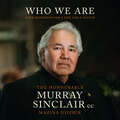
By Murray Sinclair. 2024
Named a Book to Read This Fall by CBC Books and the Toronto Star • One of Indigo’s Most Anticipated…
BooksJudge, senator, and activist. Father, grandfather, and friend. This is Murray Sinclair’s story—and the story of a nation—in his own words, an oral history that forgoes the trappings of the traditionally written memoir to center Indigenous ways of knowledge and storytelling. As Canada moves forward into the future of Reconciliation, one of its greatest leaders guides us to ask the most important and difficult question we can ask of ourselves: Who are we?For decades, Senator Sinclair has fearlessly educated Canadians about the painful truths of our history. He was the first Indigenous judge in Manitoba, and only the second Indigenous judge in Canadian history. He was the Chair of the Truth and Reconciliation Commission, and remains one of the foremost voices on Reconciliation. And now, for the first time, he shares his full story—and his full vision for our nation—with readers across Canada and beyond.Drawing on Senator Sinclair’s perspectives regarding Indigenous identity, human rights, and justice, Who We Are examines the roles of history, resistance, and resilience in the pursuit of finding a path forward, one that heals the damaged relationship between Indigenous and non-Indigenous peoples in Canada. In doing so, it reveals Senator Sinclair’s life in a new and direct way, exploring how all of these unique experiences have shaped him as an Anishinaabe man, father, and grandfather.Structured around the four questions that have long shaped Senator Sinclair’s thinking and worldview—Where do I come from? Where am I going? Why am I here? Who am I?—Who We Are takes readers into the story of his remarkable life as never before, while challenging them to embrace an inclusive vision for our shared future.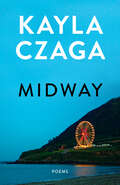
By Kayla Czaga. 2024
Honest, elegiac, characteristically strange, and frequently funny, Midway is an exploration of grief in all its manifestations. “I feel like…
the crud / I accidentally touch sometimes, whatever it is / that collects under cushions on my couch,” writes Kayla Czaga in her third collection, Midway, an exploration of grief in all its manifestations. In her search for meaning in the aftermath of her parents’ deaths, Czaga visits the underworld (at least twice), Vietnamese restaurants, the beach, London’s Tate Modern, Las Vegas casinos, and a fish textbook. Honest, elegiac, characteristically strange, and frequently funny, these poems take the reader through bright scenery like carnival rides with fast climbs and sudden drops. The meanings and messages Czaga uncovers on her travels are complicated: hopeful, bleak—both comforting and not. Along with the parents the poet mourns, this collection showcases a varied cast. A suburban father-in-law copes with a troubling diagnosis. Marge Simpson quits The Simpsons. Death is a metalhead who dates girls too young for him. Midway is a welcome and necessary collection from one of the most celebrated and accomplished poets of her generation.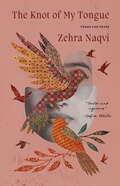
By Zehra Naqvi. 2024
For readers of Fatimah Asghar&’s If They Come for Us, here is a searing, multidimensional debut about the search for…
language and self, which is life itself.I knew it was time to build what could carry, what could find the high point to name what I knew to be the world and carry it with meAt the heart of The Knot of My Tongue is Zehra Naqvi&’s storying of language itself and the self-re-visioning that follows devastating personal rupture. Employing a variety of poetic forms, these intimate, searching poems address generations, continents, and dominions to examine loss of expression in the aftermath of collisions with powerful forces, ranging from histories to intimacies. Naqvi follows a cast of characters from personal memory, family history, and Quranic traditions, at instances where they have either been rendered silent or found ways to attempt the inexpressible—a father struggling to speak as an immigrant in Canada; a grandmother as she loses her children and her home after the 1947 Partition; the Islamic story of Hajar, abandoned in the desert without water; the myth of Philomela who finds language even after her husband cuts off her tongue. Brilliantly blending the personal and the communal, memory and myth, theology and tradition, the poems in this collection train our attention—slow and immediate, public and private—on our primal ability to communicate, recover, and survive. This example is striking for the power of its speaking through loss and a singular, radiant vision.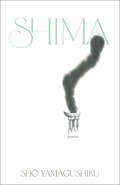
By Sho Yamagushiku. 2024
A vivid, expansive vision of intergenerational witness and repair.The village is tilting on its axis. It is turning. All its…
organs are spilling into the bay.shima is a mosaic of the emotional, psychic, and generational toll that exile from a pillaged culture impresses on a poet and his community. Come to haunt yamagushiku&’s practice of ancestor veneration are photographs and a narrative that spans his own life and a mythic parallel filled with a voice as spare as it is present, yearning as it is precise. The poet says, I am taking the sharpest stick and poking the root ancestor. I am insisting that if he awakens I will have something useful to say.Speaking through a cultural amnesia collected between a sunken past and a sensed, ghostly-dreamed future, shima anchors this interrogation of the relationship between father and son in the fragile connective tissue of memory where the poet&’s homeland is an impossible destination.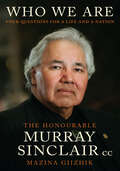
By Murray Sinclair. 2024
Named a Book to Read This Fall by CBC Books and the Toronto Star • One of Indigo&’s Most Anticipated…
BooksJudge, senator, and activist. Father, grandfather, and friend. This is Murray Sinclair&’s story—and the story of a nation—in his own words, an oral history that forgoes the trappings of the traditionally written memoir to center Indigenous ways of knowledge and storytelling. As Canada moves forward into the future of Reconciliation, one of its greatest leaders guides us to ask the most important and difficult question we can ask of ourselves: Who are we?For decades, Senator Sinclair has fearlessly educated Canadians about the painful truths of our history. He was the first Indigenous judge in Manitoba, and only the second Indigenous judge in Canadian history. He was the Chair of the Truth and Reconciliation Commission, and remains one of the foremost voices on Reconciliation. And now, for the first time, he shares his full story—and his full vision for our nation—with readers across Canada and beyond.Drawing on Senator Sinclair&’s perspectives regarding Indigenous identity, human rights, and justice, Who We Are examines the roles of history, resistance, and resilience in the pursuit of finding a path forward, one that heals the damaged relationship between Indigenous and non-Indigenous peoples in Canada. In doing so, it reveals Senator Sinclair&’s life in a new and direct way, exploring how all of these unique experiences have shaped him as an Anishinaabe man, father, and grandfather.Structured around the four questions that have long shaped Senator Sinclair&’s thinking and worldview—Where do I come from? Where am I going? Why am I here? Who am I?—Who We Are takes readers into the story of his remarkable life as never before, while challenging them to embrace an inclusive vision for our shared future.